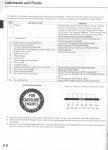I notice that the owner's manual for my 2004 Pilot does not mention chassis lube. I assume that this means that it has no grease fittings. Can someone confirm this? I would climb under the car right now but it is raining cats & dogs here.
I am very skeptical of claims for permanently lubed joints. I had another car with no grease fittings but I installed them anyway. I was very glad that I did because when I lubed the joints, especially during the winter or spring, water would be forced out of the joints. There was nothing special about those "maintenence free" joints at all except that the manufacturer was too cheap to install six grease fittings. However, maybe Honda does have better joints that do not require lube (although I am still skeptical about any such claims).
Any info on honda joints would be greatly appreciated.
Thanks
I am very skeptical of claims for permanently lubed joints. I had another car with no grease fittings but I installed them anyway. I was very glad that I did because when I lubed the joints, especially during the winter or spring, water would be forced out of the joints. There was nothing special about those "maintenence free" joints at all except that the manufacturer was too cheap to install six grease fittings. However, maybe Honda does have better joints that do not require lube (although I am still skeptical about any such claims).
Any info on honda joints would be greatly appreciated.
Thanks








